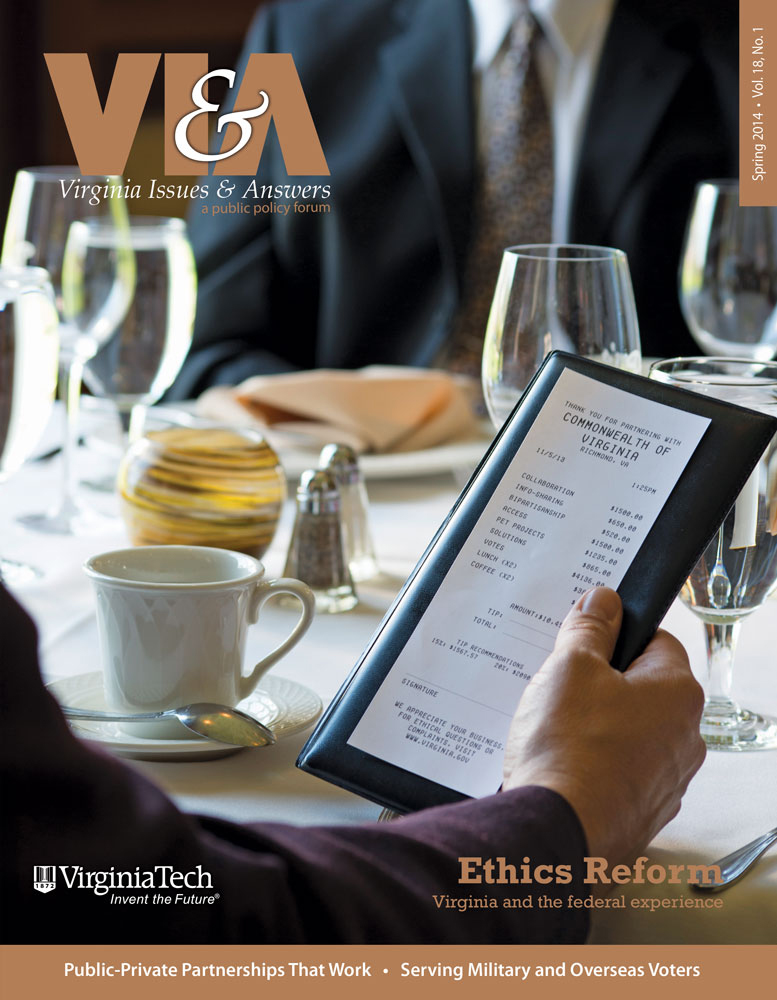Virginia Issues & Answers explores ethics reform, public-private partnerships, and military and overseas voting

The Spring 2014 issue of Virginia Issues & Answers, a public policy forum published by Virginia Tech’s School of Public and International Affairs, explores several important policy areas that are before the commonwealth in 2014 including ethics reform, public-private partnerships, and military and overseas voting.
In the cover story, “Ethics Reform Legislation: The Federal Experience and the Commonwealth of Virginia,” Chris Yianilos, director of Federal Relations at Virginia Tech and former deputy chief of staff for senator John Warner, and Chris DeLacy, an attorney with Holland & Knight's Political Law Group and former counsel for senator John Warner, provide a thoughtful review of federal ethics reforms enacted in the last decade. They describe several of the reforms considered in Virginia, including restrictions on gifts for elected officials and family members and the creation of independent ethics commissions or agencies, and discuss the benefits and drawbacks of many similar reforms put in place in Washington, D.C.
“Ethics Reform in the States,” by Peggy Kerns, the director of the Center for Ethics in Government at the National Conference of State Legislatures, provides an overview of recent ethics reform efforts at the state level around the nation based on the research of the National Conference of State Legislatures’ Center for Ethics in Government.
Three experts provide their perspectives on the topic of public-private partnerships in this issue. “Public/Private Partnerships: Trends, Issues and Policy Considerations,” by former Newport News City Manager Neil Morgan, notes a number of examples of public-private partnerships and raises several key questions that should be asked when forming such partnerships. It identifies policy options that address accountability concerns that also may have the benefit of broadening the opportunity for smaller organizations and communities to benefit from these kinds of increasingly popular agreements.
In the article, “Shared Goals and Mutual Respect: The Arlington ‘P3’ Experience,” Charlotte Franklin of the Arlington County Office of Emergency Management describes Arlington County’s experience working with private-sector firms on disaster recovery efforts via collaborative networks. Robert A. Stalzer of Fairfax County discusses the leadership and management skills that Fairfax County found essential in coordinating effective implementation of public-private partnerships agreements in “The Importance of Executive Leadership in Leading a Successful Public-Private Partnership Project.”
The spring issue also examines the difficulties that military and overseas voters in Virginia face when exercising their right to vote, particularly when deployed overseas or as first responders in times of a disaster. In “Ensuring the Franchise for Remote Military and Overseas Voters,” Secretary of the Virginia Board of Elections Donald Palmer highlights the difficulties that military and overseas voters in Virginia face today in exercising their right to vote, particularly when deployed overseas or as first responders in times of a disaster. Tom Parkins, City of Alexandria registrar, describes how his office is working to implement new Virginia requirements for photo identification at the polls that will take effect in 2014. In “Photo IDs: The Outreach Challenge for Virginia Election Officials,” Parkins outlines the legislation’s origin, implementation of similar laws in other states, and the City of Alexandria’s plans to implement the changes without disenfranchising voters.
Virginia Issues & Answers is a public policy forum published as an outreach service of Virginia Tech. This is the first time that the magazine, published in print and online, has been released under the new editorial leadership of the School of Public and International Affairs.
The School of Public and International Affairs, a school within Virginia Tech’s College of Architecture and Urban Studies, comprises the Center for Public Administration and Policy, Government and International Affairs, and Urban Affairs and Planning across three Virginia locations, in Blacksburg, Alexandria, and Richmond.




